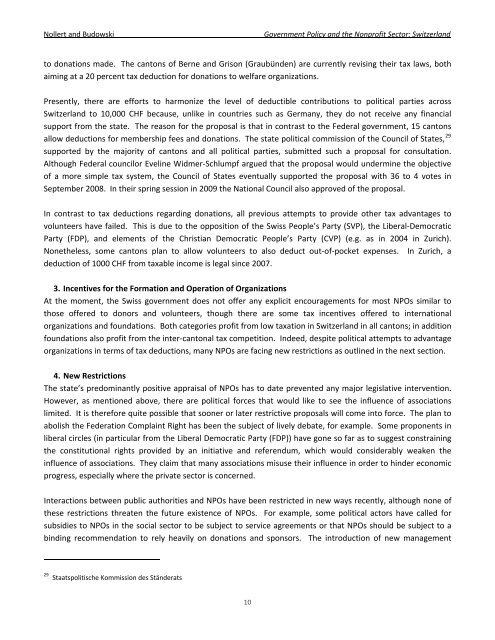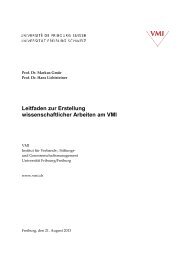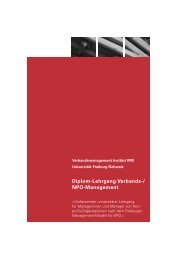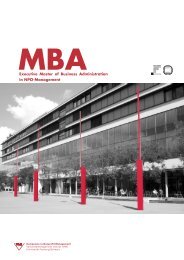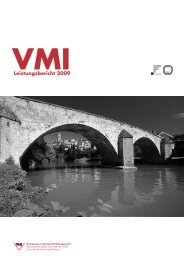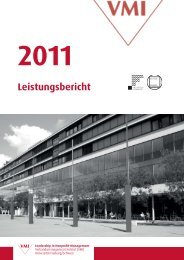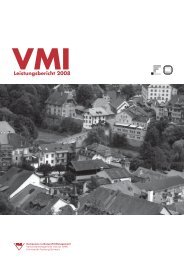Government Policy and the Nonprofit Sector: Switzerland - VMI
Government Policy and the Nonprofit Sector: Switzerland - VMI
Government Policy and the Nonprofit Sector: Switzerland - VMI
- TAGS
- nonprofit
- switzerland
- vmi.ch
You also want an ePaper? Increase the reach of your titles
YUMPU automatically turns print PDFs into web optimized ePapers that Google loves.
Nollert <strong>and</strong> Budowski <strong>Government</strong> <strong>Policy</strong> <strong>and</strong> <strong>the</strong> <strong>Nonprofit</strong> <strong>Sector</strong>: Switzerl<strong>and</strong><br />
to donations made. The cantons of Berne <strong>and</strong> Grison (Graubünden) are currently revising <strong>the</strong>ir tax laws, both<br />
aiming at a 20 percent tax deduction for donations to welfare organizations.<br />
Presently, <strong>the</strong>re are efforts to harmonize <strong>the</strong> level of deductible contributions to political parties across<br />
Switzerl<strong>and</strong> to 10,000 CHF because, unlike in countries such as Germany, <strong>the</strong>y do not receive any financial<br />
support from <strong>the</strong> state. The reason for <strong>the</strong> proposal is that in contrast to <strong>the</strong> Federal government, 15 cantons<br />
allow deductions for membership fees <strong>and</strong> donations. The state political commission of <strong>the</strong> Council of States, 29<br />
supported by <strong>the</strong> majority of cantons <strong>and</strong> all political parties, submitted such a proposal for consultation.<br />
Although Federal councilor Eveline Widmer‐Schlumpf argued that <strong>the</strong> proposal would undermine <strong>the</strong> objective<br />
of a more simple tax system, <strong>the</strong> Council of States eventually supported <strong>the</strong> proposal with 36 to 4 votes in<br />
September 2008. In <strong>the</strong>ir spring session in 2009 <strong>the</strong> National Council also approved of <strong>the</strong> proposal.<br />
In contrast to tax deductions regarding donations, all previous attempts to provide o<strong>the</strong>r tax advantages to<br />
volunteers have failed. This is due to <strong>the</strong> opposition of <strong>the</strong> Swiss People’s Party (SVP), <strong>the</strong> Liberal‐Democratic<br />
Party (FDP), <strong>and</strong> elements of <strong>the</strong> Christian Democratic People’s Party (CVP) (e.g. as in 2004 in Zurich).<br />
None<strong>the</strong>less, some cantons plan to allow volunteers to also deduct out‐of‐pocket expenses. In Zurich, a<br />
deduction of 1000 CHF from taxable income is legal since 2007.<br />
3. Incentives for <strong>the</strong> Formation <strong>and</strong> Operation of Organizations<br />
At <strong>the</strong> moment, <strong>the</strong> Swiss government does not offer any explicit encouragements for most NPOs similar to<br />
those offered to donors <strong>and</strong> volunteers, though <strong>the</strong>re are some tax incentives offered to international<br />
organizations <strong>and</strong> foundations. Both categories profit from low taxation in Switzerl<strong>and</strong> in all cantons; in addition<br />
foundations also profit from <strong>the</strong> inter‐cantonal tax competition. Indeed, despite political attempts to advantage<br />
organizations in terms of tax deductions, many NPOs are facing new restrictions as outlined in <strong>the</strong> next section.<br />
4. New Restrictions<br />
The state’s predominantly positive appraisal of NPOs has to date prevented any major legislative intervention.<br />
However, as mentioned above, <strong>the</strong>re are political forces that would like to see <strong>the</strong> influence of associations<br />
limited. It is <strong>the</strong>refore quite possible that sooner or later restrictive proposals will come into force. The plan to<br />
abolish <strong>the</strong> Federation Complaint Right has been <strong>the</strong> subject of lively debate, for example. Some proponents in<br />
liberal circles (in particular from <strong>the</strong> Liberal Democratic Party (FDP)) have gone so far as to suggest constraining<br />
<strong>the</strong> constitutional rights provided by an initiative <strong>and</strong> referendum, which would considerably weaken <strong>the</strong><br />
influence of associations. They claim that many associations misuse <strong>the</strong>ir influence in order to hinder economic<br />
progress, especially where <strong>the</strong> private sector is concerned.<br />
Interactions between public authorities <strong>and</strong> NPOs have been restricted in new ways recently, although none of<br />
<strong>the</strong>se restrictions threaten <strong>the</strong> future existence of NPOs. For example, some political actors have called for<br />
subsidies to NPOs in <strong>the</strong> social sector to be subject to service agreements or that NPOs should be subject to a<br />
binding recommendation to rely heavily on donations <strong>and</strong> sponsors. The introduction of new management<br />
29 Staatspolitische Kommission des Ständerats<br />
10


